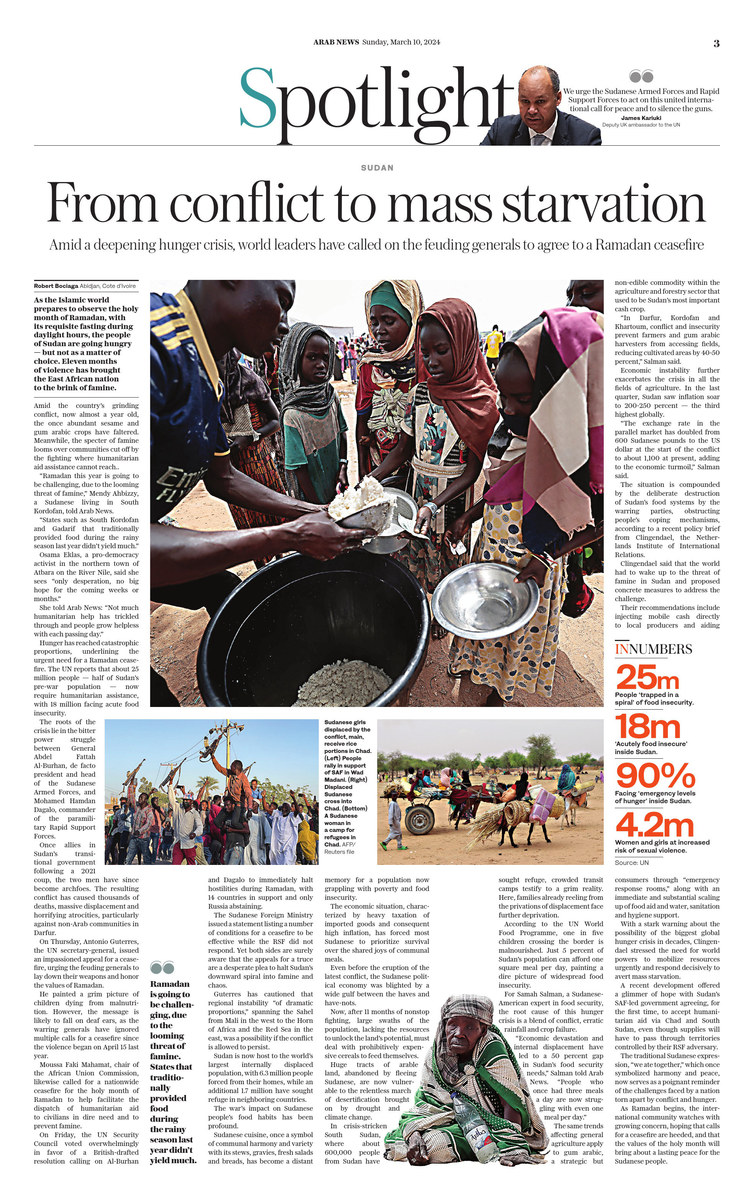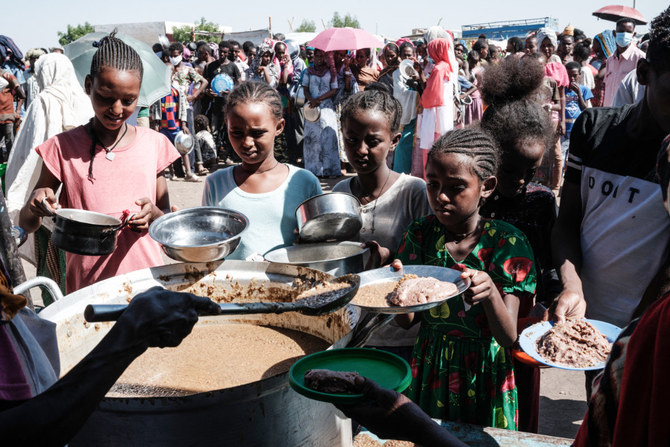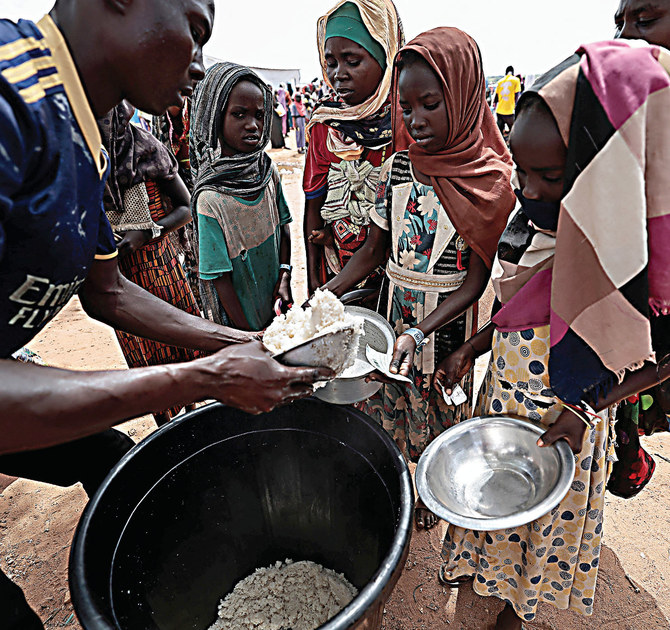ABIDJAN, Cote d’Ivoire: As the Islamic world prepares to observe the holy month of Ramadan, with its requisite fasting during daylight hours, the people of Sudan are going hungry — but not as a matter of choice. Eleven months of violence has brought the East African nation to the brink of famine.
Amid the country’s grinding conflict, now almost a year old, once abundant sesame and gum arabic harvests have faltered. Meanwhile, the specter of famine looms over communities cut off by the fighting where humanitarian aid assistance cannot reach.
“Ramadan this year is going to be challenging, due to the looming threat of famine,” Mendy Ahbizzy, a Sudanese living in South Kordofan, told Arab News.
“States such as South Kordofan and Gadarif that traditionally provided food during the rainy season last year didn’t yield much.”
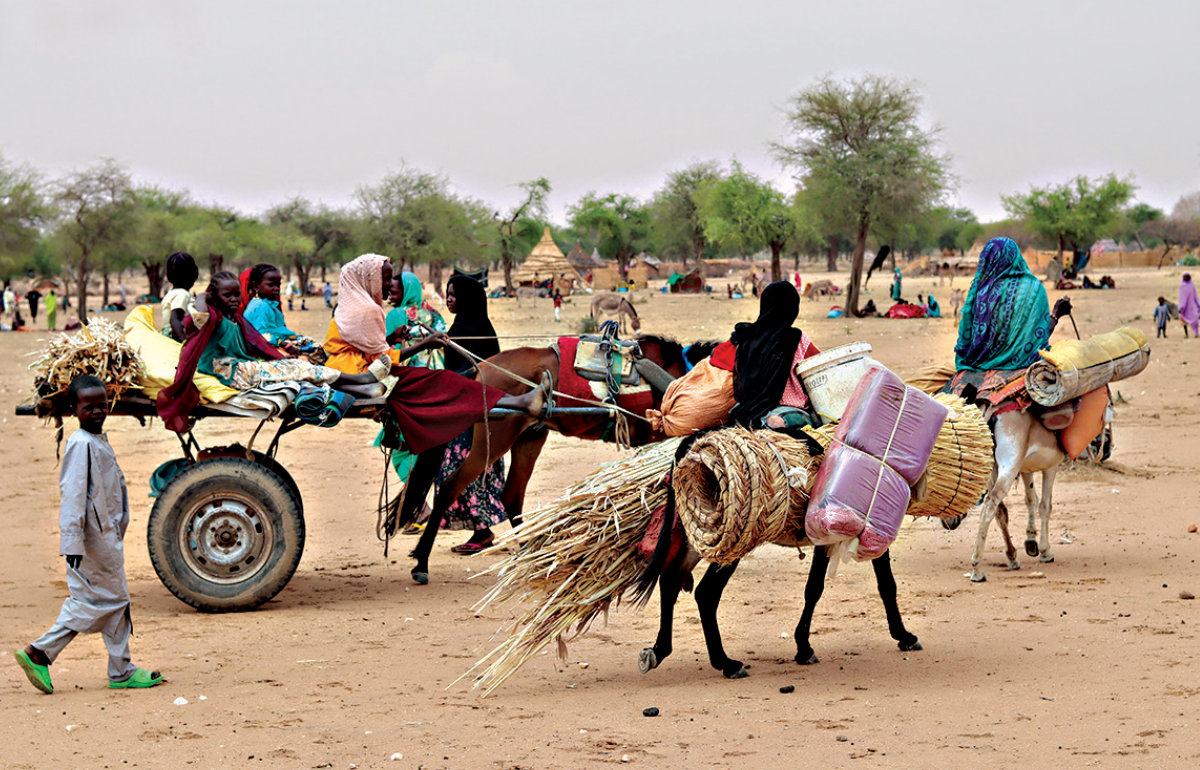
Mass displacement of Sudanese, leaving in whatever vehicles they can from Khartoum or any other city. (AFP)
Osama Eklas, a pro-democracy activist in the northern town of Atbara on the River Nile, said she sees “only desperation, no big hope for the coming weeks or months.”
She told Arab News: “Not much humanitarian help has trickled through and people grow helpless with each passing day.”
Hunger has reached catastrophic proportions, underlining the urgent need for a Ramadan ceasefire. The UN reports that about 25 million people — half of Sudan’s pre-war population — now require humanitarian assistance, with 18 million facing acute food insecurity.

Sudanese refugees in camps in neighboring countries face the threat of decreasing food aid as the UN suffers from a cut in funding support. (AFP)
The roots of the crisis lie in the bitter power struggle between General Abdel Fattah Al-Burhan, de facto president and head of the Sudanese Armed Forces (SAF), and Mohamed Hamdan Dagalo, commander of the paramilitary Rapid Support Forces (RSF).
Once allies in Sudan’s transitional government following a 2021 coup, the two men have since become archfoes. The resulting conflict has caused thousands of deaths, massive displacement and horrifying atrocities, particularly against non-Arab communities in Darfur.
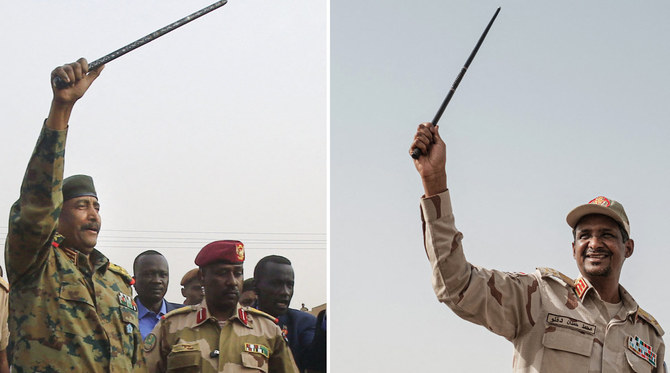
Sudanese Armed Forces chief Abdel Fattah Al-Burhan (left) and his former deputy, Mohamed Hamdan Dagalo, commander of the Rapid Support Forces. (AFP)
On Thursday, Antonio Guterres, the UN secretary-general, issued an impassioned appeal for a ceasefire, urging the feuding generals to lay down their weapons and honor the values of Ramadan.
He painted a grim picture of children dying from malnutrition. However, the message is likely to fall on deaf ears: the warring factions have ignored multiple calls for a ceasefire since the violence began on April 15 last year.
Moussa Faki Mahamat, chair of the African Union Commission, likewise called for a nationwide ceasefire for the holy month of Ramadan to help facilitate the dispatch of humanitarian aid to civilians in dire need and to prevent famine.
IN NUMBERS
• 25 million People ‘trapped in a spiral’ of food insecurity.
• 18 million ‘Acutely food insecure’ inside Sudan.
• 90% Facing ‘emergency levels of hunger’ inside Sudan.
• 4.2 million Women and girls at increased risk of sexual violence.
(Source: UN)
On Friday, the UN Security Council voted overwhelmingly in favor of a British-drafted resolution calling on Al-Burhan and Dagalo to immediately halt hostilities during Ramadan, with 14 countries in support and only Russia abstaining.
The Sudanese foreign ministry issued a statement listing a number of conditions for a ceasefire to be effective while the RSF did not respond. Yet both sides are surely aware that the appeals for a truce are a desperate plea to halt Sudan’s downward spiral into famine and chaos.
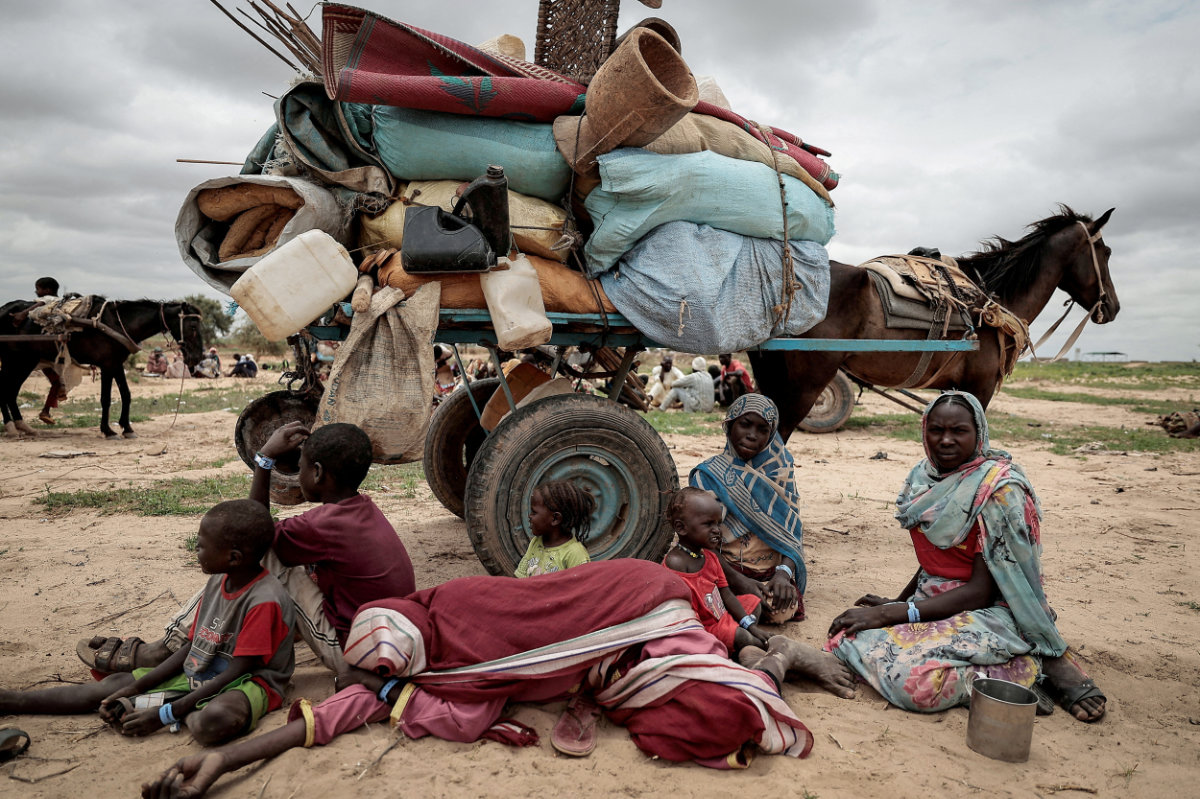
The UN's World Food Programme said it had to cut assistance to Sudanese refugees in Chad for lack of funds. (AFP photo/File)
Guterres has cautioned that regional instability “of dramatic proportions,” spanning the Sahel from Mali in the west to the Horn of Africa and the Red Sea in the east, was a possibility if the conflict is allowed to persist.
Sudan is now host to the world’s largest internally displaced population, with 6.3 million people forced from their homes, while an additional 1.7 million have sought refuge in neighboring countries.
The war’s impact on Sudanese people’s food habits has been profound.

Sudanese cuisine, once a symbol of communal harmony and variety with its stews, gravies, fresh salads and breads, has become a distant memory for a population now grappling with poverty and food insecurity.
The economic situation, characterized by heavy taxation of imported goods and consequent high inflation, has forced most Sudanese to prioritize survival over the shared joys of communal meals.
Even before the eruption of the latest conflict, the Sudanese political economy was blighted by a wide gulf between the haves and have-nots.

People rally in support of Sudan's army in Wad Madani on December 17, 2023, amid the ongoing war against the paramilitary Rapid Support Forces. (AFP/File)
Now, after 11 months of nonstop fighting, large swathes of the population, lacking the resources to unlock the land’s potential, must deal with prohibitively expensive cereals to feed themselves.
Huge tracts of arable land, abandoned by fleeing Sudanese, are now vulnerable to the relentless march of desertification brought on by drought and climate change.
In crisis-stricken South Sudan, where about 600,000 people from Sudan have sought refuge, crowded transit camps testify to a grim reality. Here, families already reeling from the privations of displacement face further deprivation.
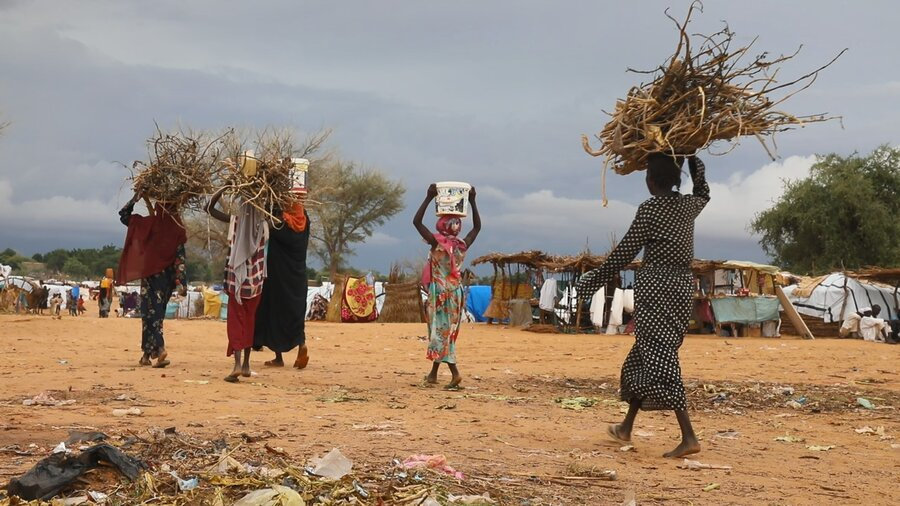
The UN's World Food Programme said it had to cut assistance to Sudanese refugees in Chad for lack of funds. (Photo courtesy: WFP/Eloge Mbaihondoum)
According to the UN World Food Programme, one in five children crossing the border is malnourished. Just 5 percent of Sudan’s population can afford one square meal per day, painting a dire picture of widespread food insecurity.
For Samah Salman, a Sudanese-American expert in food security, the root cause of this hunger crisis is a blend of conflict, erratic rainfall and crop failure.
“Economic devastation and internal displacement have led to a 50 percent gap in Sudan’s food security needs,” Salman told Arab News. “People who once had three meals a day are now struggling with even one meal per day.”

People who once had three meals a day are now struggling with even one meal per day. (AFP/File)
The same trends affecting general agriculture apply to gum arabic, a strategic but non-edible commodity within the agriculture and forestry sector that used to be Sudan’s most important cash crop.
“In Darfur, Kordofan and Khartoum, conflict and insecurity prevent farmers and gum arabic harvesters from accessing fields, reducing cultivated areas by 40-50 percent,” Salman said.

The war in Sudan has seriously affected the production of gum arabic resin, one of the country's top exports. (AFP/File)
Economic instability further exacerbates the crisis in all the fields of agriculture. In the last quarter, Sudan saw inflation soar to 200-250 percent — the third highest globally.
“The exchange rate in the parallel market has doubled from 600 Sudanese pounds to the US dollar at the start of the conflict to about 1,100 at present, adding to the economic turmoil,” Salman said.
The situation is compounded by the deliberate destruction of Sudan’s food systems by the warring parties, obstructing people’s coping mechanisms, according to a recent policy brief from Clingendael, the Netherlands Institute of International Relations.
Clingendael said that the world had to wake up to the threat of famine in Sudan and proposed concrete measures to address the challenge.

Traders and donkey farmers gather in an open market in Gedaref state in eastern Sudan on February 16, 2024, amid increasing uses for donkeys in transportation due to fuel and petrol shortages in the war-torn country,. (AFP)
Their recommendations include injecting mobile cash directly to local producers and aiding consumers through “emergency response rooms,” along with an immediate and substantial scaling up of food aid and water, sanitation and hygiene support.
With a stark warning about the possibility of the biggest global hunger crisis in decades, Clingendael stressed the need for world powers to mobilize resources urgently and respond decisively to avert mass starvation.
A recent development offered a glimmer of hope with Sudan’s SAF-led government agreeing, for the first time, to accept humanitarian aid via Chad and South Sudan, even though supplies will have to pass through territories controlled by their RSF adversary.
The traditional Sudanese expression, “we ate together,” which once symbolized harmony and peace, now serves as a poignant reminder of the challenges faced by a nation torn apart by conflict and hunger.
As Ramadan begins, the international community watches with growing concern, hoping that calls for a ceasefire are heeded, and that the values of the holy month will bring about a lasting peace for the Sudanese people.
